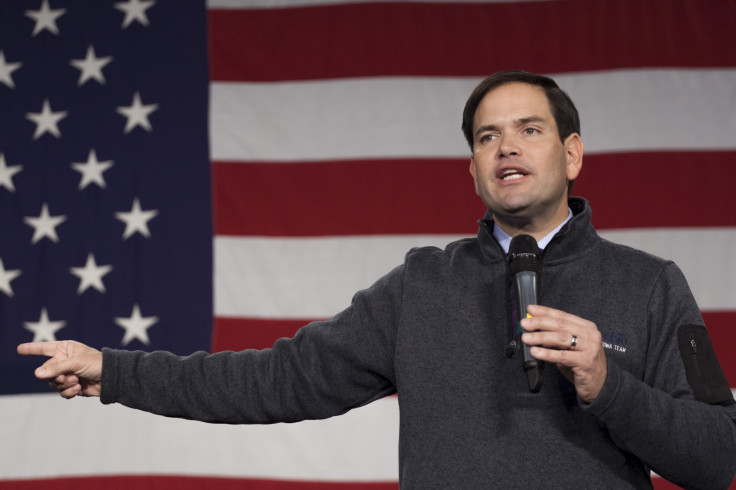Marco Rubio Immigration Reform: Republican Won't Reverse Obama Executive Action As President

Republican presidential candidate and Florida Sen. Marco Rubio said in April he wouldn’t immediately revoke President Barack Obama’s Deferred Action for Childhood Arrivals program should he become president. Rival candidate Donald Trump criticized Rubio for the position Tuesday, saying that his statements disqualified the senator from being president.
The DACA program allows young undocumented immigrants who were brought to the United States as children to apply for temporary legal status in the country.
Marco Rubio would keep Barack Obama’s executive order on amnesty intact. See article. Cannot be President.
https://t.co/JW5f8OouyA
— Donald J. Trump (@realDonaldTrump) November 3, 2015
In the April segment, recorded on Univision in English, Rubio said he didn't think the program could be immediately revoked when the next president takes office. Rubio went on to say DACA will have to end at some point and that he hopes that it will end through permanent immigration law reforms. The interview was with anchor Jorge Ramos, whom Trump later threw out of a news conference.
“It cannot be the permanent policy of the United States,” Rubio said. “But I’m not calling for it to be revoked tomorrow or this week or right away.”
Trump has taken a hard line toward undocumented immigrants since joining the 2016 Republican nominating race in June. He began his candidacy with a speech that called some Mexicans criminals and rapists, and has called for the deportation of the estimated 11 million undocumented immigrants in the country.
“I understand we have a serious problem in America, we have 12 million human beings who are in this country illegally,” Rubio went on to say during the April interview, which occurred before Trump began his candidacy. “Not even the most vociferous opponents of immigration reform are offering up ideas about rounding up and deporting 12 million people. We’re going to have to deal with that in a reasonable and realistic way.”
The first-term senator, a son of Cuban immigrants, also commented in April on Obama’s order granting temporary legal status to parents of the young adults and children eligible for DACA. It has been stalled by a court review. On that policy, Rubio answered forcefully. “I would revoke it,” he said. “It is hurting our efforts to reform our immigration laws. It is adding credibility to the argument that we cannot do immigration reform because the federal government is not serious about enforcing immigration laws and preventing a future illegal immigration crisis.”
Rubio has shifted his immigration policies substantially over the last few years as he prepared to run for president. In 2013, he was a leader of the “gang of eight” senators that pushed for comprehensive immigration reform. That bill passed the Senate but did not make it past the House. In the years since, Rubio has adopted a border-enforcement-first position.
© Copyright IBTimes 2025. All rights reserved.






















